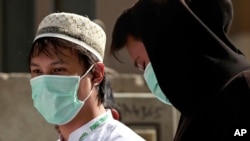A World Health Organization mission is going to Saudi Arabia in the coming week, at the request of the government, to take preventive measures against an anticipated spring season upsurge of Middle East Respiratory Syndrome, also known as MERS-Corona virus.
Saudi Arabia is entering the third year of battling the MERS-Corona virus. WHO researchers have reported at least 975 cases, including 358 deaths — a 35 percent fatality rate — from the disease since 2012.
Since the last large MERS-Corona outbreak in May and June of last year, the WHO says there have been smaller surges in Saudi Arabia due to hospital outbreaks. It also says new cases of the disease now are being reported on an almost daily basis. Cases of MERS-Corona virus also are occurring in Oman and United Arab Emirates, but to a lesser extent.
WHO Manager of International Food Safety Peter Ben Embarek says people mainly get the virus through contact with camels, or through close contact with people who have the disease in hospitals and households.
But, he tells VOA, the disease remains shrouded in mystery and that little is known about what causes the disease in camels or why it is centered in this region.
“It is true that there are camels elsewhere, [so] it might be a combination of a mix of climatic conditions, traditions, ways of interacting with camels that might be different in other parts of the world," he said. "Perhaps also better health care systems that are better prepared and better capable of detecting cases. The symptoms are not very specific initially and could be easily missed or mistaken for something else.”
The WHO recently reported a case of MERS in the Philippines, where a 32-year-old nurse tested positive Wednesday. The nurse had returned from Saudi Arabia on February 1.
Embarek says all of the nurse's contacts in the Philippines are being followed, and that 11 people who were showing signs of respiratory symptoms have been tested. Though all tested negative, they will be retested.
He says camels do not show severe symptoms, although they sometimes manifest mild respiratory symptoms. He says camels excrete the virus through respiratory tracts, which is then transmitted and circulated.
He says surveillance systems should be increased, especially in parts of the world with large camel populations.
“In terms of the human cases, again we are seeing the whole spectrum, a little bit like with the common flu," he said. "Some people who are having underlying conditions, suffering from a weak immune system due to diabetes or heart disease and so on, would typically see a much more severe course of the disease. If you are a healthy young adult, for example, and working on the farm or taking care of camels, you probably only show mild symptoms — a little bit of fever maybe, but nothing alarming.”
The WHO advises people suffering from underlying conditions to avoid close contact with camels and abstain from drinking raw camel milk.
They also say people should exercise caution when visiting markets and apply good hygiene practices and avoid unnecessary visits to health centers and places where the virus is suspected of circulating.




